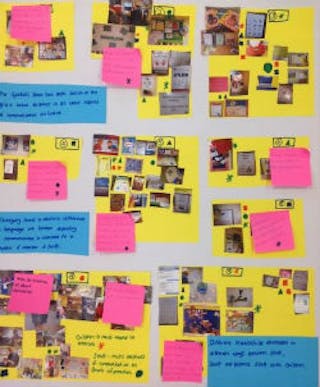Literacies for Employability

Researchers
Amanda French, Alex Kendall, Phil Taylor
Background
This was a collaborative project led by Birmingham City University staff who worked with partner institutions (University of Worcester, Nottingham Trent University and Solihull College) to roll out the project materials.
Watch the project rollout session
Aim of research
The project aimed to:
- improve student understanding of employability as a dynamic, lifelong concept
- offer students the opportunity to investigate, analyse and describe the literacy practices of workplaces and placements that they encountered whilst at university
- identify and evaluate workplace literacies in structured contexts
- make contributions that add value to employers
- encourage tutors to co-investigate workplace literacies with their students
- provide a meta-narrative of workplace literacies across different occupations
- embed overt instruction of workplace literacies into curriculum design across different disciplines
Method of research
The research included a detailed literature framework, project wiki and an advisory forum.
A draft L4E framework made use of Allwright’s (2003) practitioner research model and involved three stages: actions for understanding; reflection and review; and actions for change. A group of nine Student Researchers (SRs) were recruited through an open call via the University’s student employment agency. The recruitment process ensured that SRs were working in a variety of employment settings either as part of a work placement or in temporary part-time posts.
The SRs attended three workshops:
- The first in December 2012 explored conceptualisations of literacy and the workplace as a domain for literacy practices, and introduced the draft L4E framework for the SRs to take in to the field where they used it to photograph and reflect on literacy in practice.
- A second workshop in February 2013 reviewed data collection and experiences from the field.
- At a final workshop in March 2013 SRs prepared posters as an aid to exploring and patterning their empirical material, and then presented their findings to the group.
Following the third workshop the framework was redesigned and a team bought in to develop an L4E ‘app’ to:
- enable students to use the framework in an integrated way with their mobile devices to make fieldwork more efficient and effective
- facilitate file sharing between students and their peers and students and their tutors
- enable tutors to accrue employment literacies repositories relevant to their field/curriculum
Outcomes
- An underpinning literature review
- The L4E framework app
- Literacies for Employability Wiki and free to download project assets
- L4E mini-documentary - The mini-documentary, publically available in Spring 2014 documents the development of the L4E framework and its use and value in 3 disciplines and contexts.
Application of research
The collaborative approach to building, developing and disseminating the L4E framework has enabled the team to form a local network.
All the project assets are available as free downloads. This means that it is possible to re-contextualise the work undertaken through the project in new settings.
Since designing and using the app, the project team have evaluated wider uses of the framework app concept as a pedagogical tool to facilitate and scaffold ‘in-field investigative learning’. Funding has recently been secured from the HEA to explore the use of the tool for Masters research students.
This project developed a framework for workplace literacies.